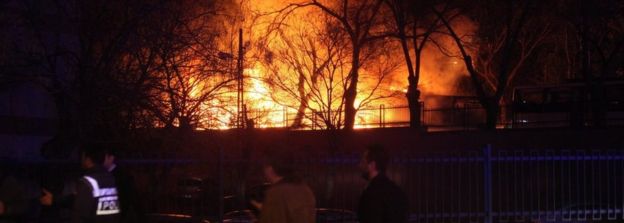Ankara blast: At least 28 dead in Turkish capital explosion
BBC
A large explosion in the Turkish capital, Ankara, has left at least 28 people dead and 61 injured, Turkish officials have said.
A vehicle full of explosives was detonated as military buses were passing by, according to the Ankara governor’s office.
The blast happened in an area close to parliament and Turkey’s military headquarters.
Deputy Prime Minister Bekir Bozdag called it an “act of terrorism”.
Large plumes of smoke were seen rising from the area and witnesses said the blast was heard all over the city.
Some of the victims were civilians.
No group has so far claimed responsibility for the attack.
Turkey violence: How dangerous is instability?

Ambulances and fire engines were sent to the scene.
Security forces carried out a controlled explosion on a suspect package after the blast.
President Recep Tayyip Erdogan said Turkey was more determined than ever to use “its right to self-defence”.
In a statement released several hours after the attack, he said: “Our determination to respond in kind to attacks taking place inside and outside our borders is getting stronger with such acts.”
Mr Erdogan has cancelled a planned trip to Azerbaijan on Thursday, Reuters reports.
Turkish Prime Minister Ahmet Davutoglu has also cancelled a visit to Brussels on Thursday where he was due to attend meetings about the refugee crisis in Europe.
The US condemned the attack. Mark Toner from the State Department offered condolences to the families of the victims, adding: “We reaffirm our strong partnership with our Nato ally Turkey in combating the shared threat of terrorism attacks.”
Turkey has been hit by a series of attacks recently, and there have been increasing concerns that the country could be targeted by another big attack.
In a separate development on Wednesday, an explosion damaged a building housing a Turkish cultural centre near the Swedish capital Stockholm, local officials said. No-one was injured.
It was not clear if the incident was linked to the Ankara blast.
‘Dark mood across Turkey’ – by Selin Girit, in Istanbul
 Image copyrightEPA
Image copyrightEPA“Enough is enough! Do not kill any more! Do not make the people of this country sad anymore…”
Just one tweet summarising the dark mood across Turkey.
Hundreds of people have been offering their condolences to the relatives of the dead, condemning the attack, posting pictures and videos of the aftermath of the scene on social media.
The attack targeted a shuttle bus carrying military personnel, and there were several other military vehicles nearby – all of which were waiting at the traffic lights. Most of the casualties are believed to be soldiers.
The Turkish army strongly condemned the attack and called this “a treacherous terror act”. The government and the opposition parties have also strongly condemned the incident.
In October, more than 100 people were killed in simultaneous explosions targeting a peace march in Ankara. That attack had polarised society further.
Whether Turkey can unify in pain this time round is yet to be seen.
It is not clear who was behind the blast in Ankara; security sources blamed both so-called Islamic State (IS) and militants from the banned Kurdistan Workers Party (PKK), Reuters reported.
A government spokesman said the attack had been well planned.
Recent attacks in Turkey
- January 2016: At least 10 people, mostly German tourists, are killed in a suspected IS suicide bombing in Istanbul
- October 2015: More than a hundred people are killed in a double-suicide bombing at a Kurdish peace rally in Ankara
- July 2015: In the predominantly Kurdish town of Suruc, near the Syrian border, over 30 people are killed in a suicide bombing, again blamed on IS
The PKK has been fighting for autonomy for Turkey’s Kurdish minority for decades and has carried out regular attacks on Turkish security forces.
The blast in Ankara comes as Turkey steps up its involvement in the conflict in neighbouring Syria.
It has been shelling the Kurdish YPG militia in northern Syria, who it sees as allied to the PKK.
Turkey has also allowed the coalition bombing IS to use one of its air bases.
